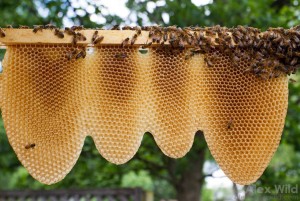Program gives insight into bees and their role in food chain
October 31, 2015
Honey bees contribute more than $14 billion worth of value to U.S. crops. annually, according to the American Beekeeping Federation. (Photo courtesy U of I Extension)
It is a well-known fact that we need honey bees for a multitude of food crops. According to the American Beekeeping Federation the honey bees contribute more than $14 billion worth of value to U.S. crops annually.
A great example of the importance of honey bees can be seen when growing strawberries. As many as 20 visits from bees to each receptacle are required to fully pollinate all the flowers. An increase in final berry weight can be seen with as many as 60 visits.
Anyone interested in keeping bees or in gardening to conserve bees should attend the Beekeeping 101 workshop from 6:30 to 8 p.m. on Tuesday, Nov. 3 at the University of Illinois Extension in Woodford County, 109 E. Eureka Ave., Eureka.
Learn about how to cultivate these important crop pollinators from expert beekeepers Tom Pankonen and Patti Koranda from Bloomington. They will teach basic beekeeping to both the novice and the experienced beekeepers and will answer any questions you may have.
They will touch on life cycle, lifespan, hardware/equipment, keeping a beekeeper’s calendar, diseases and pests. A honey tasting will provide nourishment for our working brains.
Pankonen is the owner and operator of Honey Pimp Apiaries, a small business located in Bloomington. He wrangles about 30-50 hives, depending on the season. Pankonen’s business is focused on producing strong healthy bees that can overcome local challenges like climate, pests, chemicals, and disease.
Pankonen speaks periodically at events in the community, schools, clubs, and to anyone who will listen to information about the blood, sweat, and tears that go into being a beekeeper.
Koranda is highly involved in the Illinois State University Beekeeping Club and helps keep bees at the Sugar Grove Nature Center. She also is a hobbyist beekeeper. She is a huge advocate of promoting beekeeping and educating the public of their importance.
Koranda says more people should keep bees because it can be easily adopted whether you live in the country or in town.
Bees are happy with the early fall warm weather and all the food provided by the rains. She feeds her bees with a flower planting of native perennial and bee friendly annuals and expects them to pollinate vegetables from the garden and a small orchard.
To register for the program, got to https://web.extension.illinois.edu/lmw/register. A fee of $5 will be collected to offset the cost of the program. If you need a reasonable accommodation to participate in this program, contact us at (309) 467-3789.
Kelly Allsup is a horticulture unit educator with the Livingston, McLean and Woodford University of Illinois Extension (309) 663-8306, kallsup@illinois.edu.
— Program gives insight into bees and their role in food chain —



